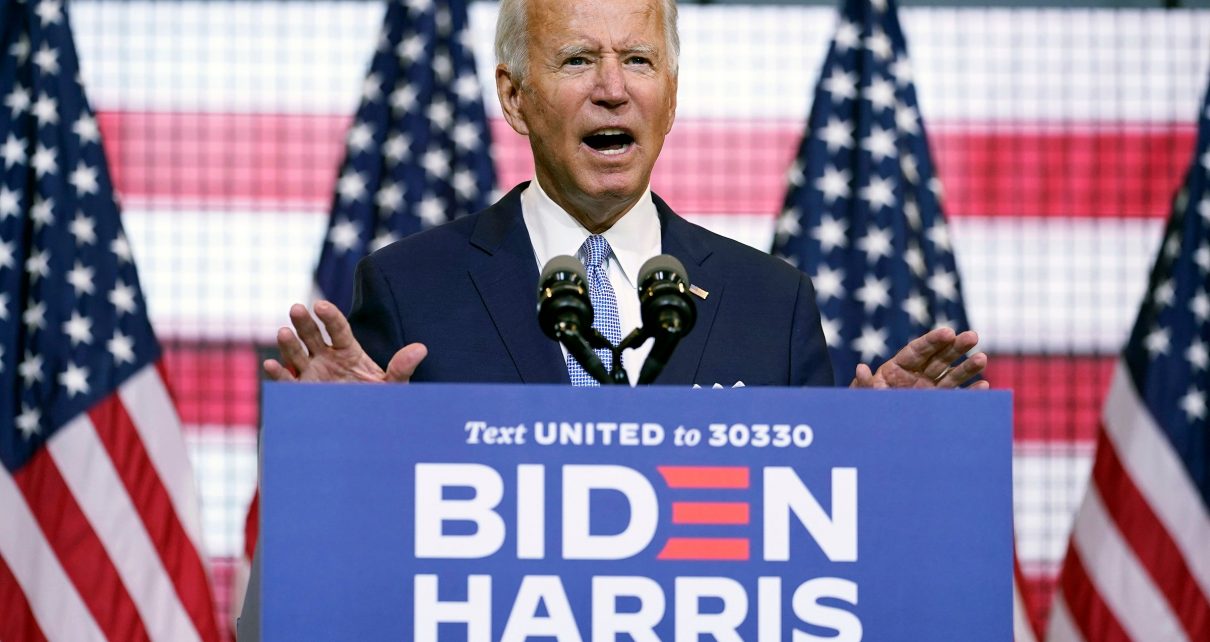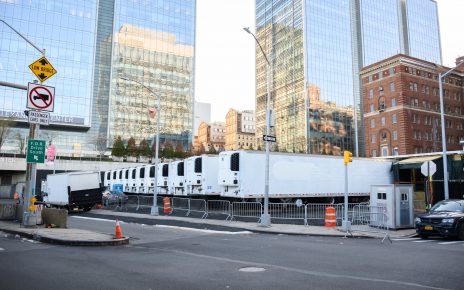Election Day in the United States is a little more than a month away, and scientists are watching the outcome of the presidential race closely. President Donald Trump’s handling of the coronavirus pandemic, actions to downplay climate change and perpetuation of misinformation have horrified many scientists. “We face a national crisis unlike any we have witnessed,” says a statement of concern about the state of democracy in the country, drafted by US scientists and signed by more than 3,400 supporters in response to Trump’s leadership.
Early polls show that Democratic challenger Joe Biden and his running mate, senator Kamala Harris of California, have a lead over the Republican ticket of Trump and vice-president Mike Pence. But what does Biden, a six-term senator from Delaware who served as vice-president under former president Barack Obama, stand for science-wise? Nature interviewed current advisers to Biden, advisers who served during Obama’s presidency and policy analysts about actions the former vice-president might take in five key science areas if he’s elected. (The Biden campaign did not respond to questions from Nature.)
Pandemic response
If Biden wins the election on 3 November, he will inherit not only a country in the throes of a pandemic that’s destroyed lives and livelihoods—but also one in which public opinion is deeply divided over the true extent of the coronavirus outbreak and the measures taken to abate it. Despite public-health agencies counting more than 200,000 COVID-19 deaths in the country, some Trump supporters feel that the impact of the virus has been exaggerated in an effort to control the populace.
Biden would also inherit a haphazard pandemic response, researchers say. “The problem with our whole response is that we’ve been changing the response since day one,” says Georges Benjamin, the executive director of the American Public Health Association in Washington DC. This has led to testing failures, a lack of contact tracing, confusion and debate about wearing face masks and restrictions on gatherings—and ultimately to the highest death toll in the world, says Benjamin. Coming in with a strong response plan and the ability to adapt to an evolving situation will be crucial for steadying both the outbreak and the US economy, he adds.
Biden’s pandemic plans—which his team has been preparing since March, say sources close to the campaign—promise to ramp up the country’s test-and-trace programmes; address racial and ethnic disparities in COVID-19 infection rates and outcomes; and rebuild pandemic-readiness programmes cut by the Trump administration.
Still, it will take time to bring the pandemic under control in the United States, says Kavita Patel, a physician who advises on health policy for Harris but is not currently advising the campaign. Biden’s staff members, she says, “need to hit the ground running” in order to turn the US response around.
Months of Trump politicizing the pandemic will be hard to undo. The president has repeatedly said that wearing masks is unnecessary, despite public-health researchers’ assurances that they are among the most effective non-pharmaceutical interventions for preventing viral spread. The Biden team will need to change the public-health messaging so that it supports the science without driving sceptics even further away, says Marta Wosińska, the deputy director of Duke University’s Margolis Center for Health Policy in Durham, North Carolina. “We need to figure out a bipartisan push and identify who are the right messengers.”
If Biden wins, his administration will have to tackle public mistrust of the federal agencies leading the US response to curtail the pandemic. The Trump administration has criticized and censored guidance from the Centers for Disease Control and Prevention (CDC) and has claimed, without evidence, that the Food and Drug Administration (FDA) is intentionally slowing vaccine testing to hurt his re-election chances. The Biden campaign has stated that his administration would direct the CDC to issue transparent, evidence-based guidance around the public-health risks of reopening restaurants, schools and public spaces. This could also go a long way towards restoring morale within the CDC and the FDA. “Agency scientists feel marginalized and that their voices aren’t heard,” Patel says. “You need someone who can reinvigorate them.”
If elected, Biden has committed to supporting the World Health Organization (WHO), which Trump began to withdraw the United States from in July. As well as providing badly needed funds to the WHO to fight the coronavirus, polio and other diseases globally, reinstating the United States’ commitment to the organization would pave the way for joining its international COVAX facility, which aims to accelerate the search for and manufacture of coronavirus vaccines.
Trump’s vaccine initiative, Operation Warp Speed, includes funds for manufacturing, but Wosińska says that sufficient supplies aren’t assured without international partnerships, including COVAX. “We haven’t come to the table with other countries on vaccines, and that could change the course of how things play out,” she says. But even with these partnerships, it will take time to adequately expand global manufacturing. Biden has committed to continue supporting coronavirus-vaccine research, and has pledged that an eventual vaccine will be priced fairly by the federal government.
In the longer term, researchers hope that a Biden administration will build up US public-health infrastructure to better prepare for future crises. “We absolutely know how to do this. We know what it looks like,” says Benjamin. “We just have to have the leadership and the commitment of resources to do it.”
Climate change
The coronavirus pandemic isn’t the only divisive issue that Biden would face if elected—he would also be confronting climate change. Trump has moved to pull the United States out of the 2015 Paris climate treaty, rolled back a suite of regulations intended to reduce greenhouse-gas regulations and called global warming a hoax.
In contrast, Biden is now campaigning on the most aggressive climate platform ever advanced by a US presidential nominee in the general election. Addressing the demands of an increasingly vocal liberal base, his US$2-trillion plan calls for massive investments in clean-energy research and development and low-carbon infrastructure, such as public transit and energy-efficient buildings. It also calls for the United States to generate 100% clean electricity by 2035 and to produce “net-zero emissions” by 2050. The question facing Biden and his team, if they win in November, is how to make it happen.
Biden has said he will have the United States rejoin the Paris climate accord, making the country an active partner of the more than 190 nations that have committed to limiting global warming to 1.5–2 oC above pre-industrial levels. He would also appoint climate-friendly leadership at the Environmental Protection Agency and quickly move to restore—or even bolster—climate and environmental regulations rolled back under Trump over the past four years. It could take a few years to finalize those changes, but Biden could do so with existing authority under federal law.
The first big opportunity to advance climate legislation through Congress would probably come in the form of an economic stimulus plan to revive the US economy in the wake of the coronavirus pandemic. Campaigning under the slogan “Build back better”, Biden and his fellow Democrats are likely to add investments in energy, climate, infrastructure and environmental justice to that plan. But whether the legislation makes it through depends on whether the Democrats take back the Senate and maintain their majority in the House of Representatives during the upcoming election.
“If they have the votes, the stimulus package could be the single-most important climate policy that this country has ever adopted,” says David Victor, a political scientist at the University of California, San Diego.
If the Democrats do win a majority in the Senate, they will still need to contend with a filibuster rule that requires 60 out of the chamber’s 100 possible votes to pass major legislation. Democrats currently hold 45 seats in the Senate, and getting to 60 would be tough, so senior Democrats are considering getting rid of the rule if their party wins in November. According to Leah Stokes, a political scientist at the University of California, Santa Barbara, who is volunteering for the Biden campaign: “We may get Democratic reform first, and use that to secure climate reform.”
Research priorities
As well as tackling the pandemic and climate change, a President Biden would have the opportunity to develop other science priorities for his administration. This process typically includes tapping experts to coordinate science policy and establishing research focuses for the White House. (The actual job of doling out science funding is left to Congress.)
These advisers will be crucial because although Biden and Harris generally support science and its role in crafting public policy, neither has worked extensively on science issues. When he served in the Senate, Biden’s focus was more on foreign affairs and the judiciary, and Harris has a background in criminal justice, including her former position as California’s attorney general.
If Biden is elected, he should choose a science adviser as quickly as possible to start developing and implementing whatever research priorities do emerge, says Michael Lubell, a physicist and science-policy expert at the City College of New York. That position is currently held by meteorologist Kelvin Droegemeier—who did not start until nearly two years into Trump’s presidency.
Droegemeier and the Trump administration have focused on, among other things, initiatives in artificial intelligence and quantum science, areas that are seen as necessary to keep the United States competitive with China. If Biden were to win the presidency, those would probably continue to be areas of focus—in part because Congress is interested in them. As a former senator, Biden “will likely look to the Senate for ideas,” says Jenny Luray, vice-president of strategy and communications for Research!America in Washington DC. Other potential focuses could include manufacturing technology, public health and health disparities, she says.
Biden’s most obvious research interest has been in cancer science, particularly following the death of his 46-year-old son Beau in 2015 to brain cancer. As vice-president, Biden headed a government ‘cancer moonshot’ initiative that kicked off in 2016, the last year of Obama’s presidency. It aimed to speed up the rate of progress against the disease by coordinating with companies and researchers to share data and results. The initiative later morphed into a non-profit group, which Biden suspended last year after deciding to run for president.
“Biden will want to make sure that any momentum from that effort that began in 2016 has not waned,” says Jon Retzlaff, vice-president for science policy and government affairs at the American Association for Cancer Research. He also notes that Harris’s mother, Shyamala Gopalan, a major influence on the vice-presidential candidate, was a leading breast-cancer researcher who died of cancer. The combination of Biden’s and Harris’s personal histories with the disease would probably mean that cancer and medical research will be a priority of the administration, he says.
But beyond medical research, Biden’s broad science priorities remain a bit of a mystery. Despite having nearly five decades in public service, when it comes to research policy, “Biden fundamentally is a blank page,” says Lubell. “He’s certainly not anti-science; it’s just not a priority.”
Space exploration
Under Trump, NASA has pursued an ambitious strategy — named Artemis, after Apollo’s twin sister—to put US astronauts on the Moon four years from now. Space exploration is one of the few areas where the Trump administration has put in significant effort to develop science policy.How Biden, if elected, might alter the course set out by Trump is another unknown. As vice-president, Biden was not deeply involved in space-policy issues—unlike Pence, who has actively worked on Trump’s space initiatives.
He did, however, express enthusiasm for space in May, when NASA sent two astronauts to the International Space Station on a privately built spacecraft for the first time. In response, Biden posted his congratulations on the website Medium—and noted that he was vice-president when this ‘commercial crew’ programme began in 2009.
NASA might not dramatically change its course under a President Biden, experts say. The Democrats’ official platform says the party is “committed to continuing space exploration and discovery”, including “NASA’s work to return Americans to the Moon and go beyond to Mars”.
But a Biden administration would have to decide what to do with NASA’s human space-flight programme, which has been through whiplash-inducing changes in recent years. In 2010, Obama cancelled earlier plans to send astronauts to the Moon and told NASA to fly them to an asteroid. Trump, in turn, redirected NASA to focus on landing humans on the Moon by the end of 2024—a highly ambitious deadline, widely assumed to fall at the end of a hypothetical second presidential term for Trump. If Biden were to become president, “I would expect that the 2024 date would disappear,” says John Logsdon, former head of the Space Policy Institute at George Washington University in Washington DC.
Beyond NASA, another question regards the fate of the National Space Council, which had been dormant since 1993 until Trump re-established it in 2017. The space council brings together representatives from various national agencies, including the military and NASA, to coordinate space policy across the government. In the past few years, it has worked to streamline regulations on the commercial use of space, to set national policy on space-traffic management and to establish a ‘space force’ as a new branch of the US military, charged with protecting the nation’s interests in space. “I think the council has proven its worth,” says Logsdon.
The National Space Council is headed by the vice-president, so Harris would take over from Pence if Biden is elected. Harris has not worked much on space issues, but Logsdon notes that in Congress she represents California, which is home to many large aerospace companies and several NASA centres. That might position her to work on issues involving the commercialization of space exploration.
International research collaborations
Scientists widely feel that Trump’s isolationist stance has eroded the position of the United States as a global leader in major scientific collaborations and dimmed its allure as a destination for foreign students and researchers. Biden’s foreign-policy and immigration plans could mend some frayed ties, but science-policy experts warn that the road to recovery will be longer than a single four-year presidential term.
Well before the 2016 election, Trump’s nationalist campaign rhetoric, with vivid promises to build a wall along the US–Mexico border, spooked foreign scientists. And weeks after his presidential inauguration, a ‘travel ban’ executive order targeted at seven Muslim-majority countries stranded international students at airports, sparked protests and sent shock waves through the US research community. “When you don’t have certainty over what the future immigration laws of the host country are going to be, you’re going to think twice before deciding to uproot yourself and move to another country to pursue your PhD,” says Ali Nouri, a molecular biologist and president of the Federation of American Scientists.
Biden has pledged to reverse the travel bans and to make it easier for foreign scientists and engineers who graduate with PhDs to permanently stay in the United States. He has also proposed to increase the number of visas available to highly skilled workers, including scientists. In contrast, the H-1B programme used by foreign workers, including scientists, has been a long-time Trump target. In June, Trump announced that there would be a pause in issuing new H-1B visas until the end of the year, contending that this would preserve US jobs for citizens in an economy endangered by the pandemic.
“What I would hope is that in the future, the United States would reverse some of these restrictions on talent flows,” says Kei Koizumi, a former White House Office of Science and Technology Policy adviser under the Obama administration, who is not currently advising Biden.
Citing the threat of foreign interference in US research, Trump’s administration has also upped scrutiny of scientists from China and of US scientists receiving foreign funding. The Federal Bureau of Investigation has sought to find, and in some cases arrest, researchers that it says were agents sent to steal scientific expertise and intellectual property on behalf of the Chinese government. In May, the United States took a new step: the issuance of rules to restrict researchers from universities associated with China’s military from entering the country.
Amid this crackdown, US scientists are concerned about racial profiling against Chinese scientists, and some scientists in China are wary of travelling to the United States for conferences or partnering on projects with US scientists. US funding agencies have denied that the increased scrutiny has caused collaborations to suffer and insist that the US government’s interest is in select cases of unethical or illegal behavior.
A President Biden would probably continue the focus on research and national security. He has pledged to out-compete China in developing crucial emerging technologies, and the United States’ effort to track China’s interference in its research laboratories began while he was still vice-president, during Obama’s second term. Regardless of the outcome in November, says Koizumi, this issue is set only to intensify, and it will be a challenge for either a Biden or a Trump administration to secure the country’s intellectual property while not alienating Chinese scientists. “You have to balance openness versus security.”
This article is reproduced with permission and was first published on October 1 2020.



